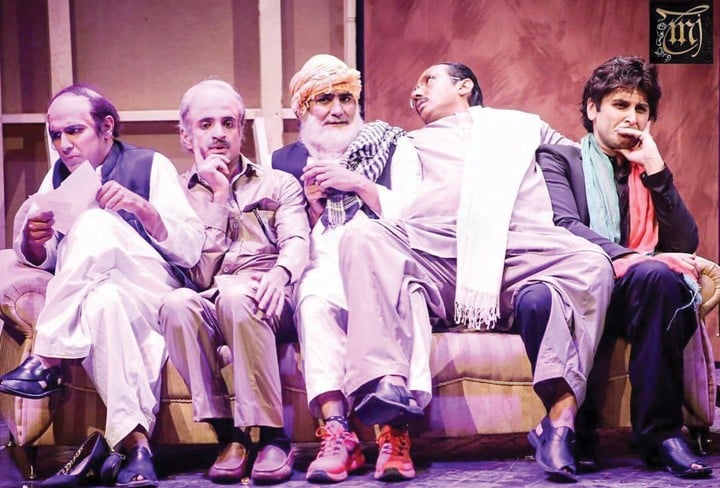
Kopykats Productions’ ongoing play Bananistan at Ali Institute of Education, a political satire comprising series of gag-reels and skits, seeks only to entertain

In his seminal work, Utilitarianism, John Stuart Mill distinguished between higher and lower pleasures -- differentiating broadly between those that appeal to the mind from those that appeal to the senses. This last weekend when I went in to see Kopykats Productions’ latest offering, Bananistan, I was expecting to see comedy laced with high thought. After all, these are the people that energised the stage with their successful production, Siachen, not too long ago. What I found was certainly not that.
Bananistan, as a play, sought simply to entertain, much to its peril. Set in the year 2030, the imagined republic of Bananistan is under military rule, rendering the political leadership unemployed. With nothing else to do, all of them -- from Nawaz Sharif to Hina Rabbani Khar -- take up roles in a ‘play within the play’. As the various political figures of Bananistan desperately attempt to pull together a performance on stage, military rule is lifted and once more these characters can vie for the highest throne in the land.
The arc of the story, if one can call it that, went a little like this. The ‘play within the play’ is in jeopardy and in complete shambles due to the incompetence of the actors. However, right around the mid-way point they all decide to pull through and deliver a good performance for the sake of their director. Confusingly enough, in the second half, nothing of the like happens and the ‘play within the play’ is as bad as it was before.
The script writers seem to have presented a conflict, offered a solution and then decided it was too lazy to go through with showing it -- continuing instead the same stream of surface-level humour that one just stops finding funny after a certain extent.
The play carried on as before, a series of gag-reels and skits. Though the actors did a fair job of portraying the likes of Imran Khan and the Sharif brothers on stage, however, the play as a whole was no different from watching a skit on ‘Hum Sab Umeed Se Hain’. Included therein was a prolonged series of wife-beating gimmicks that were most certainly in poor taste. Despite their efforts, the actors could not salvage a lazy script.
The performance stretched about five minutes of topical humour into two hours of haphazard story-telling. Not a single character went through any transformation during the play -- something that it turns out is highly unsatisfying as a viewer. For this too, the script-writer would be at fault for the characters were uni-dimensional.
I searched long and hard to find a message or an allegory hidden within but was left wanting. At best, the play was a series of oft-repeated gags. At worst, as a dear friend pointed out, the message was of a dangerous nature: By portraying civilian politicians as incapable, the writers were either yearning for a better political class or worse for the ‘third umpire’. But as I will point out to my friend, we might be reading far too much into a play that sought only to please.
In writing this review, I seek to follow the footsteps of a very distinguished professor of mine, infamous for handing out many a ‘C-grade’. His critiques of our papers were carping, and his grades were harsher yet. But in so doing he wished for us to hold ourselves to a higher standard, to push us to write not good papers but great papers.
I simply wish to hold Kopykats Productions to the high standard that they have set for themselves in their previous productions. The script of Bananistan fell short of that. The little comedic release it offered ran stale in the absence of an engaging story. The lack of complex thought in the writing of it meant that there were no moments of pause for one to ponder or emote, moments that make the theatre the theatre.